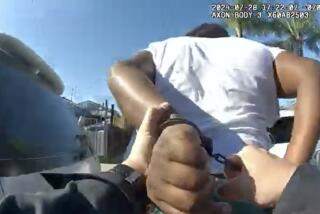Ex-Laker’s Detainment by L.A. Police Criticized : Law enforcement: Jamaal Wilkes says he was pulled over and handcuffed because he is black. The Urban League asks the LAPD for a public apology.
- Share via
During his 12-year career in professional basketball, Jamaal Wilkes compiled an impressive list of statistics.
But the prospect of “becoming just another statistic” himself was the thought Wilkes says was foremost in his mind last December when he was pulled over and handcuffed by two Los Angeles Police Department officers.
Wilkes, a businessman and board member of the Los Angeles Urban League, has accused the police of detaining him because of the color of his skin.
“As I drove off, I could not help but believe that I was stopped because I was an African-American driving a Trans Am,” the former Los Angeles Laker wrote of the Dec. 10 incident in a letter to the Wilshire Division captain. “In other words, my being stopped . . . was without probable cause and (reeked) of harassment.”
The Wilkes incident has prompted angry letters of protest from the Los Angeles Urban League to the Police Department and a call for a public apology to Wilkes.
“It’s another bitter lesson, a tragic example of harassment,” said Los Angeles Urban League President John Mack. “He was stopped because he was driving through a neighborhood where the presumption is that he was guilty and not innocent. It’s an example of another African-American being stopped because he fits the profile of a potential criminal.”
Wilshire Division Capt. J.I. Davis said an internal investigation has cleared the officers of any wrongdoing. He said the officers’ only failure may have been in inadequately explaining why Wilkes was targeted, leaving him with the impression that it was unjustified.
Wilkes, the 38-year-old president of Smooth as Silk Enterprises, a financial and real estate investment company, was stopped by police about 8:30 p.m. a few blocks from his Wilshire Boulevard office. The two officers--one male, the other female--approached the car with their hands on their holstered guns and ordered Wilkes out of his car. He said he quickly obliged.
Wilkes said he made sure to be “very cooperative,” having learned at a young age that a street corner is the wrong place to challenge an officer’s authority, especially if you are black.
“With all you read in the papers or see on television,” he said, “it is very easy to become just another statistic.”
The officers put the 6-foot, 7-inch Wilkes in handcuffs “as a matter of procedure,” the officers told him, because a computer check showed he had an outstanding felony warrant.
“I was stunned,” Wilkes said of being handcuffed. Police said Wilkes was released after a second computer check revealed his record was clear.
Wilkes said the officers gave him conflicting accounts of why he was targeted.
“First they told me I was stopped because my license tag was ‘about to expire,’ but that was not a valid reason for them to stop me,” said Wilkes. Then, he said, he was told that he was stopped because the light over his license plate was out.
“That simply wasn’t true,” he said.
Davis said the two officers were part of a special robbery unit that occasionally uses traffic stops as a pretext to investigate other criminal activities.
“I don’t want to say that Mr. Wilkes fits the profile of a robbery suspect,” Davis said. “But Mr. Wilkes was driving through a high-robbery area. Officers traditionally use minor violations in areas of high crime to provide a legal basis for making further inquiries.”
Los Angeles Urban League president Mack said Wilkes’ treatment points to a more serious problem.
“There is a lot of ugliness on the street of Los Angeles and many neighborhoods are under siege, but at the same time that does not give the police a blank check to harass innocent people,” Mack said. “Better judgment should be used by officers to reduce the likelihood of unfriendly and sometimes deadly confrontations we sometimes read about in the newspapers.”
“If such a thing can happen to Jamaal Wilkes, a law-abiding, extremely courteous gentleman, and one of our great athletic superstars,” he said, “I shudder to imagine the type of treatment many law-abiding African-American teen-agers and adults frequently receive.”
Disclosure of Wilkes’ complaint comes on the heels of a federal jury award of $540,000 to former major-league baseball player Joe Morgan, who alleged in a lawsuit that he was illegally detained and roughed up in 1988 by a Los Angeles police officer who had mistaken the Hall of Famer for a drug courier.
During the incident at Los Angeles International Airport, Morgan was grabbed around the neck, thrown to the floor and handcuffed before a crowd of onlookers. Explaining the large award against the city and a narcotics officer, one juror said: “We wanted to send a message to City Hall that police cannot act uncontrollably.”
Wilkes said that he has no plans to file a lawsuit but that he will press for the Police Department to use better judgment.
Since his retirement from basketball in 1985, Wilkes has been active in a number of charities, including the YMCA, the Boys Club of America and the American Police Hall of Fame.
Nicknamed “Silk” for his smooth playing style, Wilkes spent all of his college and most of his professional career in the Los Angeles area. The former NBA Rookie of the Year played on two undefeated teams at UCLA and four championship teams with the Golden State Warriors and the Lakers.
Wilkes said the officers apparently were not aware of his career as a professional athlete.
“I guess they are not basketball fans.”
More to Read
Sign up for Essential California
The most important California stories and recommendations in your inbox every morning.
You may occasionally receive promotional content from the Los Angeles Times.













